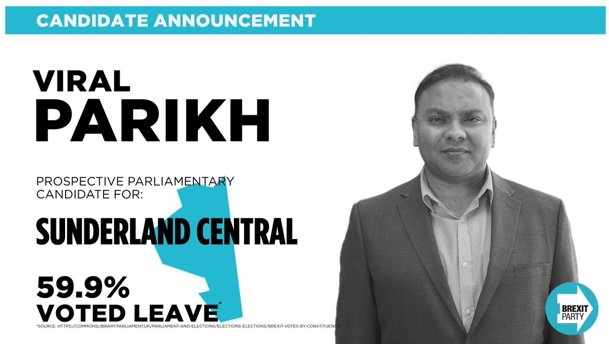“Open wide” – The bitter pill for Remain MPs to swallow
Pharmacist and Brexit Party candidate Viral Parikh dispenses the truth on drug shortages

Viral Parikh, pharmacist - © Brexit Party
Drug shortages have been occurring for years – since long before the Referendum
One of the many bitter parts of Project Fear being dispensed by Remain MPs is that people’s lives will be put at risk if the UK leaves with no deal on 31 October. These MPs and the Remain campaigners continue to threaten that life-saving drugs may no longer be available – “due to Brexit”.
Brexit Facts4EU.Org Summary
What Remain MPs fail to tell the public is that drug shortages have been a way of life for pharmacists and their customers for many years.
This is nothing new, and it has nothing to do with Brexit.
Exclusive Brexit Facts4EU.Org report – drug shortages are nothing new
The Brexit Party prospective Parliamentary candidate for Sunderland Central – and experienced pharmacist - Viral Parikh tells us exclusively about the truth behind shortages of medicines in the UK.
We have also researched the reports of the Pharmaceutical Services Negotiating Committee (PSNC). The PSNC promotes and supports the interests of all NHS community pharmacies in England. They are recognised by the Secretary of State for Health and Social Care as the body that represents NHS pharmacy contractors. They also work closely with Local Pharmaceutical Committees (LPCs) to support their role as the local NHS representative organisations.
Here is what pharmacist and Brexit Party PPC for Sunderland Central told us:
“The shortage of drugs in our country is not a new phenomenon. This has been going on since 2008 as lots of companies, wholesalers and manufacturers have stockpiled certain drugs and used stock for export purposes. This then creates a shortage in the market which enables them to raise prices.
“The shortages of medicines are due to many factors. It can be due to ingredient shortages, regulation problems, supply chain issues, less profits for the manufacturers, less demand for the product, but importantly it is to create shortages so manufacturers can increase the prices and make significant profits.
“I must stress that the shortage of medication is nothing new. During the last 10 years there were shortages of blood pressure medications like indapamide, amlodipine, thyroid medications, anti-depressants and many other types of drug. These are very common generic medications which should never have been a problem but we have been having this problem for a long time before Brexit was even a word.
“Pharmacies will suddenly discover that they can't find a medication but it is available by paying five or even as much as ten times the usual price. For example, in 2013 there was a shortage of medication for the anti-depressant sertraline. It was available - but at the price of £14-£18. The NHS-agreed price of the medication was only 85p.
“Here is another example: In 2015 the most common medication for thyroid problems, Levothyroxine, had its price raised from 65p to £2.09 just overnight. And another example: the price of the blood pressure medication amlodipine went from 24p to £3.15.
“Due to the shortages of such products, the Department of Health had to devise a system to deal with the situation, using the Pharmaceutical Services Negotiating Committee (PSNC).”
The bitter pill for Remain MPs to swallow – the truth
The simple facts are that medicine supply problems have been a regular occurrence for many years. It would have been perfectly possible for Remain MPs to have asked their researchers to investigate, and they would have found out the truth in very short order.
We looked at the information available from the representative body of NHS community pharmacy contractors in England.
Here is what the NHS-recognised pharmacy body says
The Pharmaceutical Services Negotiating Committee (PSNC) is the body referred to in section 164 (1) (a) of the National Health Service Act 2006, which the Secretary of State recognises as the representative of NHS community pharmacy contractors in England.
It turns out that drugs suddenly and regularly become unavailable at the NHS price agreed with the big pharma companies. This happens on a monthly basis. Strangely, these drugs are in fact available from other sources – but at grossly inflated prices. The PSNC liaises with the Dept of Health and the affected products are then allowed to be bought by pharmacists at the higher prices for a limited period.
And here is what Viral Parikh had to say
“The problem is that because the NHS is in public ownership no one cares and they keep on paying the money. So if I am a manufacturer or wholesaler, I will think that no-one checks so let's create a shortage and make big bucks.
No-one even thinks that we should supply alternatives and not fall into that trap.
It's really corruption of the highest order but the NHS bosses don't care. It’s not their money so they pay whatever price it takes.

Viral Parikh, pharmacist
“We need to look at radical solutions, whilst maintaining service which is free at the point of delivery. The NHS could be much more productive and it will demonstrate value for money. It could eradicate wastage, corruption, and the extensive salaries to hospital managers who aren’t even qualified clinicians and yet earn more than the Prime Minister.
“Brexit is not the cause of the shortages. It has given a chance for Remoaners to blame yet another thing on Brexit.
“One final point: does anyone genuinely believe that the pharmaceutical companies who are making billions from the NHS will suddenly stop supplying because we are out of EU? Nonsense and rubbish. Business always finds a way to do business and make profits.”
Observations
Over the last few years we have seen all manner of representations of Project Fear. The case of the threatened shortages of life-saving drugs “due to Brexit” is a particularly invidious example as it causes major anxiety for many people who have serious health conditions.
As Mr Parikh points out, when the big drug companies are making billions supplying the NHS, they are highly unlikely to allow this lucrative trade to be affected. There may well be some short-term disruption if the French or Belgians cause delays at the ports, but the Dept of Health has already been making contingency plans for this.
The key point is that shortages of some very important drugs have been commonplace for many years – since long before the EU Referendum Act was passed in 2015.
It is also a fact that drug shortages are also common in other EU countries. When this happens in France, does anyone there say that it is down to ‘Frexit’?
Note: Brexit Facts4EU.Org remains non-partisan, and we welcome contributions from representatives of all parties.
It's Sunday on a Bank Holiday weekend. Yet we continue to publish every single day, bringing readers important news and research. If you would like us to keep going, we really need your help. Quick and secure methods for making a donation are below. Thank you.
[ Sources: Viral Parikh - Brexit Party prospective parliamentary candidate for Sunderland Central | Department of Health and Social Care | Pharmaceutical Services Negotiating Committee (PSNC) ] Politicians and journalists can contact us for details, as ever.
Brexit Facts4EU.Org, Sun 25 Aug 2019
Click here to go to our news headlines
And please scroll down to COMMENT on the above article.
Since before the EU Referendum, Brexit Facts4EU.Org
has been the most prolific researcher and publisher of Brexit facts in the world.
Supported by MPs, MEPs, & other groups, our work has impact.
We think facts matter. Please donate today, so that we can continue to ensure a clean Brexit is finally delivered.
Paypal Users Only - Choose amount first
Quick One-off
Monthly


Something to say about this? Scroll down for reader comments